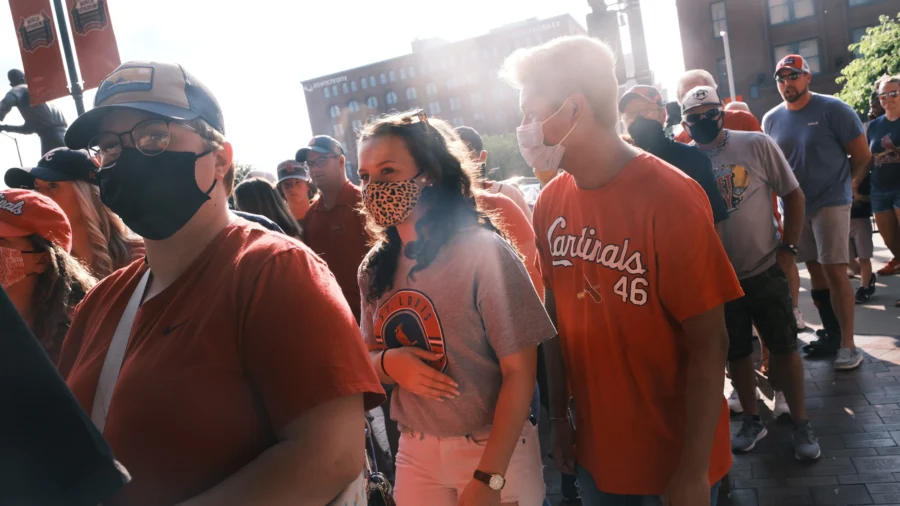Authorities in St. Louis, Missouri, have rescinded their recently-announced mask mandate while acknowledging they did not properly present the current levels of infection.
Dr. Matifadza Hlatshwayo Davis, the health director of St. Louis, told city workers recently that they would be required starting Jan. 5 to wear masks indoors and when riding with at least one other person in city vehicles, according to a letter obtained and published by KMOX-AM.
Dr. Davis said the new mask mandate was being implemented because influenza cases were 55 percent higher than the “highest median value of the past five years.” She also said cases of respiratory syncytial virus, known as RSV, and COVID-19 hospitalizations were up.
“Influenza, RSV, and COVID-19 diagnoses and hospital visits have been sharply increasing,” she said, adding that “we must take action to slow transmission and prevent strain on our hospital systems.”
The mandate was pulled about 24 hours later, St. Louis Mayor Tishaura Jones said.
“The City of St. Louis has updated its communications with employees surrounding masking,” the mayor’s office told news outlets in a statement. “The City of St. Louis Department of Health strongly recommends masking indoors for all City of St. Louis employees, effective immediately.”
The St. Louis Department of Health and the St. Louis mayor’s office did not respond to requests for comment, including for any data the city relied upon when offering the mandate and mask recommendation.
A spokesman for Missouri Gov. Michael Parson, who has said he would oppose new mask mandates, told The Epoch Times in an email: “Governor Parson kept his word. A conversation was had with the St. Louis Mayor’s Office, and a new policy has been issued reversing the earlier mask mandate as a result.”
In a Jan. 4 statement, the health department said that data from the BHC Healthcare system showed a spike in RSV cases and promoted the 55 percent higher value in influenza cases. On Friday, the health department said it had conducted a further review of the data and wanted to “clarify the information.”
“Previously reported percent change estimates compared the current RSV and flu seasons to the median of previous seasons but did not adequately adjust for differences in temporality,” health officials said.
They said that the data for RSV, influenza, and COVID-19 is now being presented compared to data from one month prior.
BJC HealthCare officials told KSDK-TV that the system “is not seeing a strain on hospital capacity” and that officials are seeing a “typical” number of cases of respiratory infections.
Mercy Hospital told the broadcaster it’s been a “typical winter,” and Dr. Jim Hinrichs, the interim co-director of the St. Louis County Department of Public Health, said that influenza levels are actually lower than last year.
The St. Louis Department of Health, in its most recent influenza season weekly report, dated Dec. 23, 2023, said that influenza-like illness reports were about 2.4 percent of all visits to emergency departments in the city. Numerically, the range of daily reports was one to 10, with 31 visits in total during the week ending on Dec. 23, 2023, officials said.
The average number of daily visits was higher than the average across the fall and winter of 2021-2022 but lower than the average across the fall and winter of 2022-2023, officials said.
New COVID-19 hospital admissions were up to 312 for the week ending Dec. 30, 2023, the highest number on record in data offered since May 2023. There were no indications, however, that officials separated so-called incidental hospitalizations, or hospital admissions where patients are admitted for a reason unrelated to COVID-19 but then tested positive for the disease.
St. Louis officials are also recommending people receive influenza, RSV, and COVID-19 vaccines despite the lack of strong data supporting receiving the shots. The latest round of COVID-19 vaccines, for instance, were cleared with data from just 50 humans and no clinical efficacy estimates.
“If we all do our part and voluntarily mask up, we can expect the number of cases and hospitalizations to decrease over the coming weeks,” Dr. Davis said in a statement.
From The Epoch Times


